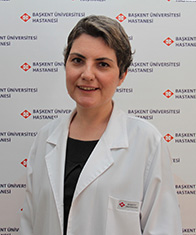The children and young people must be mentally healthy in order to achieve a healthy social structure in our country where young people make up the majority of the population. At this point, The speciality of child and adolescent psychiatry ( CAP ) has an important role. The specialty of CAP is interested in behavioral and social aspects of mental disorders as well as biological and psychological aspects of mental disorders. In this regard, it is a specialty that helps for education and preventive health. The prevention of both physical and mental disorders in adulthood can be achieved with early solution of mental problems defined in childhood.
Our department was established under the Department of Psychiatry in 2012 and has started to provide services as Department of Child and Adolescent Psychiatry under the Başkent University Faculty of Medicine since 2016.
Undergraduate Education
The courses are given to students in term 1, 2, 3, 4, 5 and 6 in undergraduate medical education. In term 1, the main topics of psychology which may be necessary for medical students are taught within the courses under the title of "Medical Psychology". In term 2, the patient-doctor relationship is explained to the students within 'Patient-Doctor Course' program. In term 3, the courses include the basic concepts of psychiatry. In the courses of term 3, the development and definition of various signs and symptoms in psychiatry are reviewed. Then it is focused on theoretical subjects, and the epidemiology, etiology and clinical features of basic psychiatric disorders are transferred.
The purpose of the courses in term 4 is to introduce the basic concepts of psychiatry to the students and to help the students to develop an understanding about mental disorders using epidemiology, etiology, clinical characteristics as a framework. The mental health problems in children and adolescents are taught to the students during this term. The psychological development of the child is explained to the students, and also they are provided to adapt to the changes associated with the development. Then the theoretical courses which are related to neurodevelopmental disorders, learning disabilities, autistic disorders, mood disorders, attachment issues, the approaches to sexual abuse, and adolescent suicide are given to the students. Besides theoretical courses, seeing patients along with lecturers, clinical discussions and supervision constitute important parts of education. It is aimed that the students are introduced with approaches in psychiatry that might help them to understand major mental disorders and patients. In the light of the theoretical and practical courses, the students are expected to gain knowledge and skills to diagnose and to treat the patients in primary health care services, and to refer appropriately to a child and adolescent psychiatry specialist if required.
In term 5, the medical ethics course is given to the students. The important issues such as the basic ethical principles of the patient-doctor relationship, the patient rights, the patient confidentiality, the doctor's obligation to keep secret information are discussed. In term 6, it is aimed that the students reinforce their theoretical informations with clinical practice. Therefore, they see patients along with the lecturers and participate in clinical discussions during their rotation.
Postgraduate Education
The training time of research assistant in the Department of Child and Adolescent Psychiatry has been identified as four years by the Ministry of Health. In accordance with the guidelines of the Ministry of Health, the compulsory rotations are as follows:
» 3 months Pediatric Neurology,
» 9 months Psychiatry
For research assistants in this department, training program is planned for each year and the courses are regularly conducted by lecturers.
Study Areas and Sciences Activities
The working principles of the Department of Child and Adolescent Psychiatry are based on providing the qualified mental health services for the patients, recognizing contemporary educational opportunities to medical students and the doctors in specialty training and promoting the studies conducted in mental health field. The services are provided in the outpatient clinic, and the consultation needs of the hospital as well as the training activities are met. Both clinical practice and training are based on the psychotherapeutic and psychopharmacological approaches.
The disorders/diseases/syndromes which are addressed in the Department of Child and Adolescent Psychiatry are listed below:
• Attention Deficit Hyperactivity Disorder
• Learning Disorders
• Autism Spectrum Disorders
• Oppositional Defiant Disorder
• Conduct Disorder
• Depressive and anxiety disorders of childhood and adolescence
• Sleep, Feeding and Eating Disorders of Infancy and Early Childhood
• Elimination Disorders
• Tic Disorders
• Childhood Speech and Language Development Disorders
• Childhood Masturbation
• Sibling Rivalry
• Adjusment and Behavioral Problems
• Thumb Sucking, Nail Biting
• Intellectual Developmental Disorder and Related Behavioral Problems
• Adolescence Problems, Parent-adolescent Conflicts, Identity Problems
• Violence related problems of childhood and adolescence
• Domestic Violence
• Foster Care and Adoption Related Problems
• Child Abuse and Neglect
• Mental Health Problems of Children, Adolescents and Families with Chronic Physical Illness
We work with the appointment system in order to give a qualified outpatient services to the patients and also take care to leave enough time for each patient.
Our academic staffs have conducted and published the scientific studies. Moreover, they have participated in the national and international conferences as speaker or listener according to the suitability of their work and so they try to reflect the contemporary psychiatric practices to their daily practices.


